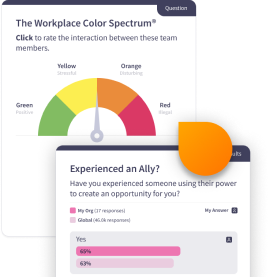
EEOC & OFCCP Compliance
Course Video Preview
A manager shares with a team member they are hiring a personal friend for a lead position without telling the team of the position being available.Building equity into every stage of the employee experience isn’t just good practice—it’s both a compliance requirement and a business advantage. True equity means aligning employees, managers, and leaders around shared values and consistent decision-making. When fairness and objectivity guide workplace choices, organizations create a culture of trust, inclusion, and accountability that strengthens overall performance.
Course DescriptionEmtrain’s Equal Employment Opportunity (EEO) course helps organizations meet EEOC and OFCCP standards while building a foundation for equity and respect across teams. The course is designed for use in all 50 U.S. states and is relevant for organizations operating in Canada. Learners explore topics such as inequity in team experiences, potential recruitment bias, and the role each employee plays in ensuring fairness in the workplace.
If your organization holds federal contracts, this course satisfies OFCCP training requirements. The latest version includes new, high-quality video lessons and an option to add industry-specific manufacturing content, allowing companies to tailor the experience to their workforce. With Emtrain’s EEO training, organizations can equip employees to make fair, consistent decisions and strengthen a workplace culture grounded in equity and compliance.
- The definition of unlawful discrimination
- Common situations in the employee experience that are prone to discrimination
- Conducting an equitable recruitment and hiring process
- Conducting an equitable career development process
- The situations that often give rise to retaliation
- The manager’s role in creating an equitable employee experience
- Affirmative action for government contractors
- Reporting, investigations and workplace policies
Course Features
- Access to our Anonymous Ask the Expert tool
- Rich video scenarios based on real-world events
- Built-in employee sentiment surveys
- 50+ Machine Translation Options
- Optional program timer
- Policy acknowledgement tool
- Extensive customization options

Lessons
(45 min)
(35 min)
Introduction
What's Unlawful Discrimination?
Definition
Recruiting and Hiring Practices
Career Development
Retaliation
The Manager's Role
Reporting, Investigations, and Workplace Policies
Provide Your Feedback
Relevant Courses
Complementary Microlessons
Recommended Resources
From ‘Ask the Expert’
Emtrain’s Ask the Expert feature enables users to ask questions about compliance, bias, harassment, and diversity & inclusion as they come up. It’s all confidential, and answers are sent straight to their inbox. View some of the example questions below and see the Experts answers.

